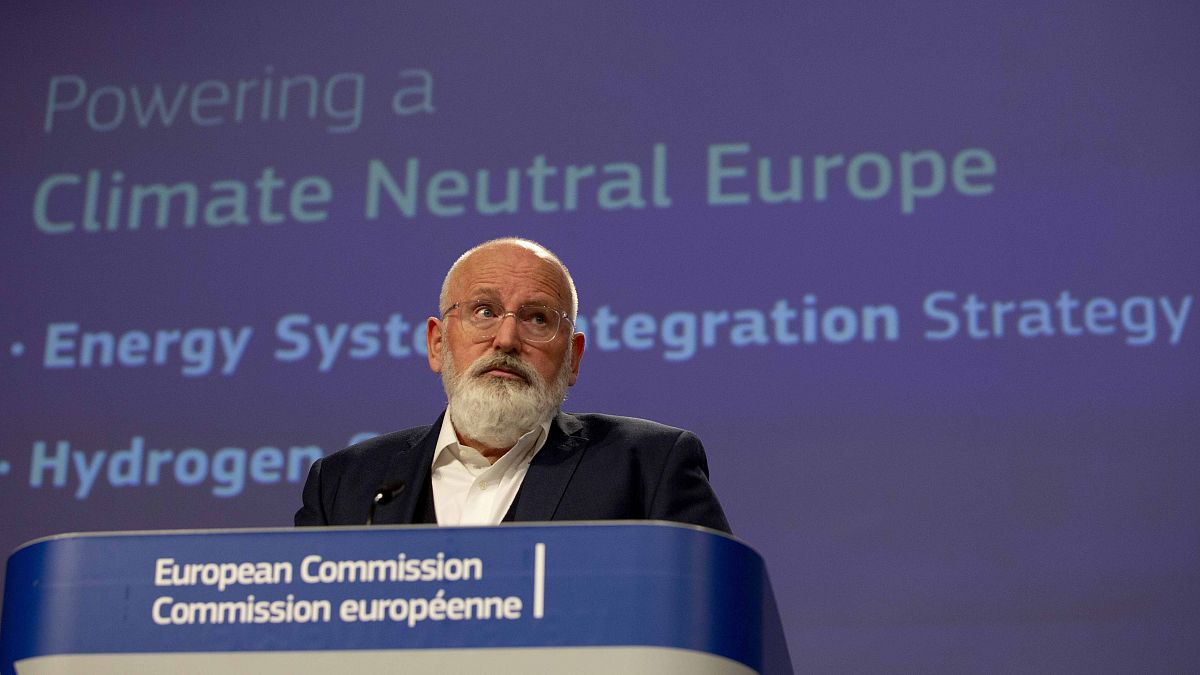The EU Commission has unveiled its latest strategy for a greener, cleaner energy future - and it's pinning its hopes on hydrogen.
The coronavirus pandemic has diverted public attention away from many pressing issues, not least the climate crisis. But behind the scenes, the EU appears to be keeping its foot on the gas in dealing with climate change.
At a press conference in Brussels on Wednesday, the European Commission unveiled its strategy for a greener, cleaner energy future, with high hopes for increased use of hydrogen across various sectors, including energy.
This new policy is set to help enforce the European Green Deal's commitment for the bloc to become carbon-neutral by 2050. Currently, the energy sector accounts for 75 per cent of the EU's greenhouse gas emissions.
The commission published its EU Strategy for Energy System Integration as a framework for an energy transition, comprising of measures to achieve a more circular system, to implement greater direct electrification and to develop clean fuels. But commissioners also believe that hydrogen has a special role to play in this seismic shift, launching the European Clean Hydrogen Alliance (ECHA).
What is hydrogen?
Firstly, what is it? We are in fact surrounded by hydrogen. The gas makes up 75 per cent of the universe. Though it's abundant in the atmosphere, it is difficult to isolate. It can be extracted through electrolysis, the process of separating hydrogen and oxygen atoms by running a high electrical current through water. This technique is quite expensive since it involves large amounts of energy to do.
The gas has many applications and can be very useful in areas that are not suited to electrification. For instance, it can be used as a fuel, an energy carrier and storage, or as a feedstock (a raw material to power a machine or an industrial process).
What are the benefits of hydrogen energy?
No other energy source is as infinite as hydrogen and, therefore, there is no possibility of it ever running out. Hydrogen can also be used in places where nuclear energy or natural gas, for instance, cannot be used, as well as being safer and less hazardous to human health.
This particular source of energy is highly efficient since it requires less energy to operate compared to fossil fuels. No harmful by-products are released into the atmosphere when used, either, which makes hydrogen a clean energy source. Once used, it can even be converted into drinking water for astronauts.
What are the downsides?
On the other hand, hydrogen still faces challenges when it comes to storage and transport, let alone the fact that its current cost of production makes it impossible for the gas to outperform other fuels for now, in spite of its plentiful supply.
Today, hydrogen represents a very small fraction of the EU's energy output, at around 2 per cent. Moreover, it still largely comes from fossil fuels - like oil, natural gas or coal - and is responsible for between 70 to 100 million tonnes of the CO2 being produced annually in the EU.
The EU Commission plans on fully decarbonising industry and turning to clean, renewable hydrogen thanks to research and innovation. Although they aim to eventually use wind, solar and hydropower energy, they do not rule out that "other forms of low-carbon hydrogen are needed to rapidly reduce emissions and support the development of a viable market."
How will the new strategy be delivered?
The road map has been designed in three phases spread over the next 30 years. Starting from today, the objective is to put in place infrastructure so production can reach up to 1 million tonnes of renewable hydrogen by 2024.
It is hoped that production will become cost-competitive from 2025 to 2030, generating up to 10 million tonnes of the gas which will then be used to power steel production, some modes of transport and so on.
By the third phase, it is hoped renewable hydrogen technologies will have reached maturity and deployed on a large scale.
From now to 2050, putting this strategy into action would amount to investments of around €180-470 billion. The European Commission has kick-started the European Clean Hydrogen Alliance this week precisely with the purpose of "identify[ing] and build[ing] up a clear pipeline of viable investment projects."
Is hydrogen a safe bet?
The EU's Hydrogen Strategy, alongside the EU Strategy for Energy System Integration, have been presented as part of Green Deal's commitments. However, given the global current crisis, commissioners argue that this framework was to boost Europe's resilience and that "the planned investments have the potential to stimulate the economic recovery from the coronavirus crisis."
Gas Policy Coordinator at Climate Action Network. Esther Bollendorff would prefer to remain vigilant. She notes the will of the Commission to draw away from fossil fuels but is concerned regarding how the ECHA would work.
"This is worrying because this is the first step into defining pilot programs and investments and the panel was outnumbered by major industrial gas leaders," such as SNAM, Gasunie, Verbund, she says.
Climate advocates note that there's been "some sort of frenzy" around hydrogen of late, whereas they believe it cannot be seen as the only solution. "We can be putting all our eggs in the same basket", Bollendorff firmly believes.
In a press release, the European networks points out that "keep[ing] the door open for the use of dirty fossil fuels [...] will not get us closer or faster to the Paris Agreement objective."
